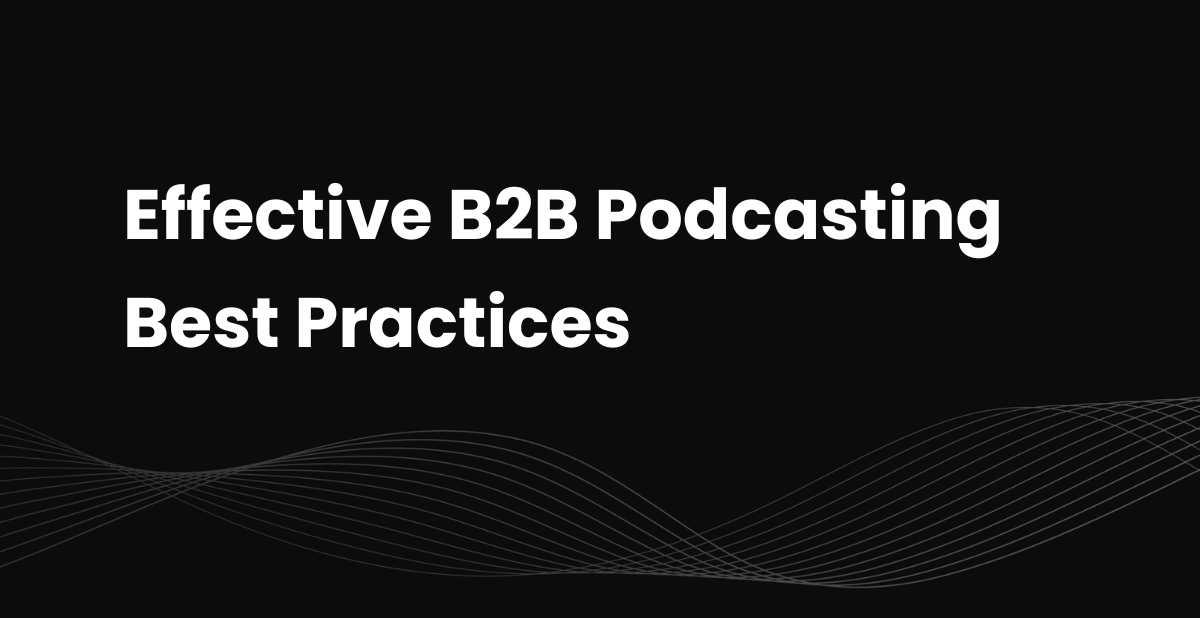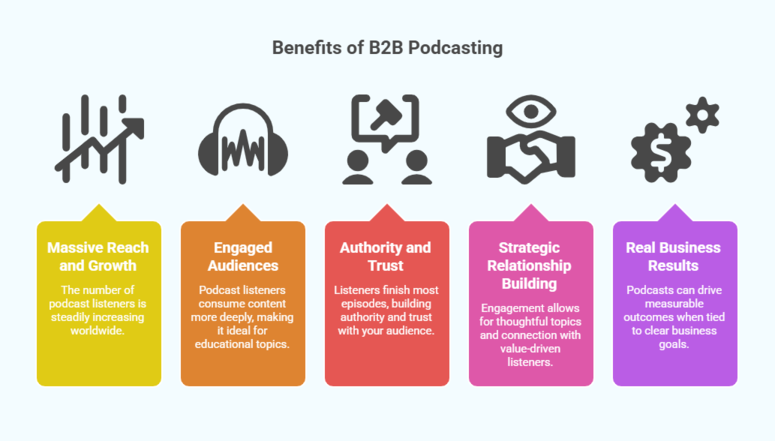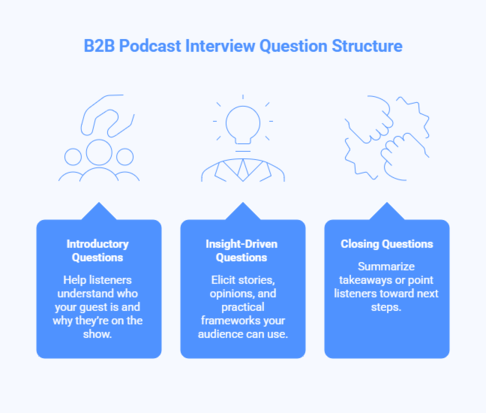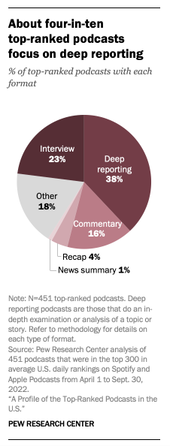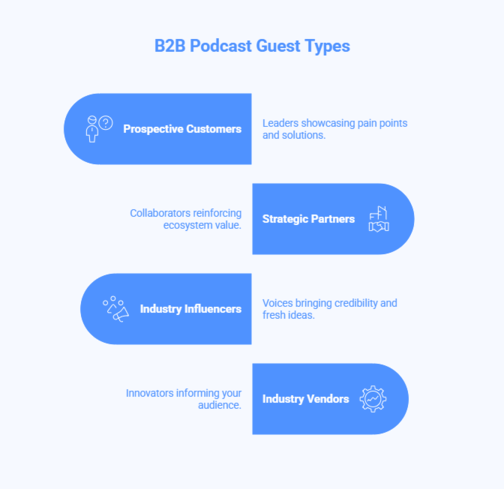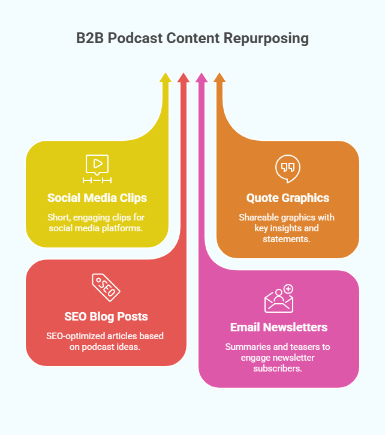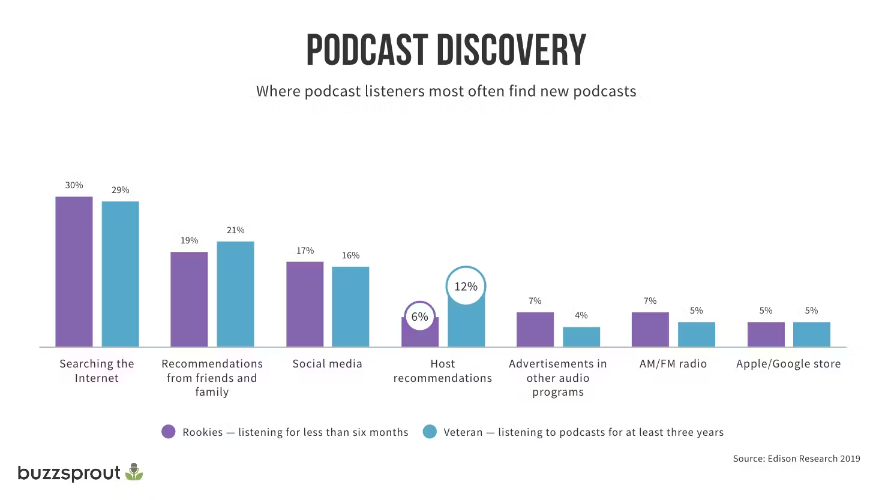10 Effective B2B Podcasting Best Practices in 2026
Starting a B2B podcast is a strategic growth engine that can help your brand build meaningful relationships with decision‑makers, raise your profile as a thought leader, and ultimately drive business outcomes.
Why? Because podcast audiences are highly engaged and increasingly part of the mainstream media.
According to The Podcast Consumer 2025 study from Edison Research, 70% of Americans age 12+ have listened to a podcast, and 55% do so monthly. This is one of the fastest‑growing channels in digital media.
In the B2B context specifically, this means access to busy professionals, executives, and buyers who are tuning in regularly, often while multitasking, and are receptive to long‑form conversations and insights that other formats just can’t deliver.
But simply launching a show isn’t enough. Like any strategic marketing initiative, a successful B2B podcast requires clear planning, intentional execution, and consistent delivery. That’s where proven best practices come in.
In this article, we’ll explore all of the best practices we use at Content Allies. We’ll share core principles and tactics that help enterprise teams consistently create high‑quality, business‑impacting episodes.
Whether you’re launching your first show or scaling an existing one, these practices will help you build a program that gets results.
TL;DR B2B Podcasting Best Practices
Define your target buyer/listener
Brainstorm a show concept that speaks to your target buyer/listener
Interview your target customers & strategic partners
Research the podcast competition
Make sure every episode has a clear call to action
Invest in high‑quality microphones
Use professional podcast recording software
Hire a podcast production agency or podcast producer
Repurpose your podcast into articles, videos, and social content
Ask your team & partners for 5‑Star reviews
Stay consistent for at least 12 months
Plan and budget your podcast costs appropriately
Why B2B Podcasting Matters in 2026
Before getting into best practices, it is crucial to understand why B2B podcasting still matters in 2026.
The following points explain why podcasts continue to earn a spot in serious B2B strategies.
Massive reach and growth
The number of people who listen to podcasts worldwide is still rising. In 2025, about 584 million people tuned into podcasts, and that number was expected to grow to over 651 million in 2027. This shows steady expansion in audience reach each year.
Engaged audiences
Podcast listeners consume content more deeply than other formats, which makes B2B podcasting ideal for nuanced, educational, or strategic topics.
Many listeners tune in regularly and commit time to each episode. For example, a sizable share of people spend more than 9 hours per week listening, and typical listeners fire up multiple episodes in a week.
Authority and trust with audiences
B2B podcast listeners behave differently from audiences in other media formats. Over 70% of listeners finish most or all of each episode, so when you talk about deep ideas or strategy, people follow along closely rather than skim.
Strategic relationship building
For B2B, this engagement matters because listeners aren’t just passively tuning in. They invest their attention and time, which gives you space to talk about thoughtful topics, build authority, and connect with people who value that level of insight. These aren’t casual viewers scrolling past something else; these are attentive listeners ready to engage.
Real business results
Podcasts can drive measurable outcomes when they are tied to clear business goals and supported with consistent distribution.
Here’s what radio personality Ira Glass says about podcasting (and we think it’s just as true for B2B shows):
“Podcasting is a democratizing force, giving anyone with a message and a microphone the ability to reach a global audience.”
For example, at Content Allies, we helped Meta’s Business Engineering team turn a stalled podcast into a reliable B2B channel. The show reached around 170,000 downloads in just 6 months and exceeded early targets by a wide margin. It now publishes consistently and features senior leaders from companies like Salesforce, LinkedIn, and SAP.
10 Effective B2B Podcasting Best Practices to Leverage in 2026
By following this list of best practices, which we’ve refined through years of working with enterprise clients, you can lay a strong foundation for a podcast that drives measurable business impact.
1. Define Your B2B Podcast Target Audience
Before starting your podcast journey, you need to get specific about who you’re trying to reach and why they matter.
With a B2B podcast, you’re not trying to appeal to the masses. Instead, you’re creating audio content that speaks directly to professionals, decision‑makers, and industry stakeholders who could become customers, partners, or advocates for your brand.
This means your show’s topics, tone, and distribution should be tailored to the preferences and needs of this audience rather than general listeners.
It helps to build detailed listener personas that go beyond titles. Understand:
Role and responsibilities (e.g., VP of Marketing, Head of Engineering)
Industry and vertical challenges (e.g., compliance issues in fintech)
Content preferences (e.g., long‑form interviews vs. short tactical episodes)
Where they spend time online (LinkedIn, industry publications, niche communities)
Getting this right means your content will feel relevant, useful, and worth their attention, which in turn increases engagement and listener loyalty.
According to the Edison report we looked at earlier, weekly podcast listening among Americans has increased by 355% over the past decade. This shows how consistently and actively people tune into podcasts as part of their regular media consumption
Matching your show with the behaviors and interests of your target professional audience means you’re tapping into a format people already use frequently to learn, explore ideas, and deepen expertise.
So how do you define your ideal listener?
First, you don’t want your persona to be so narrow that no one qualifies, but you also don’t want it so broad that your content fails to resonate. For instance:
Too broad: “Marketing professionals.”
More precise: “CMOs at mid‑market SaaS companies focused on demand generation and revenue growth.”
As per our experience working with different teams, the more precisely you understand their challenges and goals, the better you can shape content that speaks to them rather than at them.
Defining your audience up front matters in B2B podcasting because it helps you:
Choose topics that align with real business challenges
Invite guests who influence your target listener’s thinking
Create calls to action that convert listeners into pipeline or engagement signals
Build distribution strategies that reach them where they’re already active
A podcast with a clearly defined listener base becomes a powerful growth asset.
2. Brainstorm a B2B Podcast Concept that Speaks to Your Target Audience
Once you have a clear idea of who you’re targeting with your podcast, the next critical step is to develop a show concept that resonates with their real needs, interests, and challenges.
In B2B podcasting, the concept is your promise to your audience of the value they will get every time they tune in.
A well‑crafted concept helps you focus your content on topics your target listeners care about and structure episodes in a way your audience expects. We have noticed that it helps you build credibility and authority over time and differentiate your podcast from others in your niche.
Remember that a strong concept should come from your audience’s perspective, not your internal preferences or what sounds popular to other podcasters.
Wondering how to build a concept your audience will value?
Start by thinking through questions such as:
What are the recurring problems your target audience faces?
What insights would help them make smarter decisions?
What types of guests would they find authoritative and informative?
What formats (interviews, roundtables, case studies) align with their learning preferences?
A compelling show concept typically includes:
A clear thematic focus: For example, “scaling enterprise marketing operations” or “digital transformation in healthcare.”
A consistent structure: Such as weekly expert interviews, case breakdowns, or trend reports
A defined value proposition: What listeners will gain from each episode
A unique point of view: Something that sets your show apart
A focused and relevant concept matters because podcast listeners are intentional.
Data from YouGov’s 2025 global audio study found that 41% of adults across 49 countries listen to podcasts for at least one hour per week, which means regular listeners are actively choosing content that fits their interests and schedules.
Let’s take a look at some practical concept frameworks for B2B podcasts that you can adapt based on your audience and goals:
Case studies and real‑world breakdowns: Walk through real business scenarios and show what worked, what didn’t, and why. This format provides immediate takeaways and practical learning.
Trend analysis and future forecasts: Position your show as a source of forward‑looking insight by exploring trends and shifts in technology, regulations, customer behavior, and market dynamics.
Problem and solution episodes: Start with a specific challenge your target listener struggles with, then dive into solutions, either through expert advice or stories from practitioners who have tackled it successfully.
Industry expert interviews: Bring in respected leaders from your audience’s field to share insights, lessons learned, and predictions. These conversations deliver credibility and give listeners relevant points they can apply directly to their work.
Read Next: How to conduct a great podcast interview
3. Avoid the Common Mistake of Talking Only to Peers
A frequent misstep in B2B podcasting is designing episodes that appeal mostly to peers, like other creators, consultants, or in‑market competitors, rather than your ideal buyers.
We have noticed that while these conversations may be enjoyable, they rarely serve your strategic goals if they don’t align with your audience’s priorities.
For example, if your target listeners are enterprise CMOs, your podcast concept should center on topics that help them solve measurable business problems, rather than on discussions about podcast production tactics or internal agency processes.
A thoughtful, audience‑centric concept draws listeners and keeps them coming back. It builds trust and strengthens your influence within your target market.
As Larry Roberts from the Readily Random Podcast says,
“...Let your podcast become a beacon for leadership in your niche and expertise.”
4. Research the B2B Podcast Competition
Before you commit to topics, formats, or guest lists, you first need to understand the competitive market. There are a lot of podcasts out there, and that means both opportunity and challenge.
According to current industry data, there are over 4.5 million podcasts worldwide available across platforms. And these number continues to grow as new creators enter the space and existing shows produce new episodes.
This level of supply means listeners have abundant choices, but it also means listeners can quickly switch away if a show doesn’t immediately offer something meaningful.
When you understand the existing market, you can:
Spot top‑performing topics and formats
Identify gaps where few shows exist
Avoid replicating shows that audiences already find elsewhere
Define a unique angle that resonates with your target listeners
Rather than competing with all podcasts, your goal should be to own a sub‑niche that aligns with your audience’s priorities.
For example, general marketing podcasts may be saturated, but there may be fewer shows focused specifically on enterprise demand generation strategy for SaaS CMOs or B2B customer success leadership at scale.
How to Research the B2B Podcast Competition
Here’s a practical approach to competitive research before you define your final concept:
Search major directories. Use platforms like Apple Podcasts, Spotify, and Podcast Index (to search keywords related to your show concept and note how many shows already focus on similar topics)
Look at show descriptions, episode titles, and formats. What are the common themes? What topics seem underexplored?
Evaluate format and focus. Some shows focus on broad industry trends, others on tactical tips, and others on narrative storytelling. Ask:
Are most shows interview‑based or solo episodes?
Which formats get the most listener engagement?
Which seem stale or repetitive?
Identify gaps and opportunities. Once you map what’s out there, look for:
Topics that no one is discussing deeply
Formats audiences might prefer, but few shows use
Industry verticals or roles that are underserved
5. Invest in a Solid Recording Setup
Great content is the heart of your podcast, but sound quality and audio branding are what keep listeners engaged long enough to hear it.
According to the Podcast Download Fall 2025 Report by Cumulus Media and Signal Hill Insights, 92% of weekly podcast consumers say they “listen” to podcasts as audio, despite the rise of video formats.
In other words, the auditory experience is still the overwhelming reason people engage deeply with podcasts.
This means two audio elements, your intro/outro music and your recorded sound quality, are going to have a major impact on the listener’s perception, credibility, and willingness to stay tuned.
For B2B podcasts, you need something professional, distinctive, and aligned with your show’s personality.
We have seen that most podcasters source tracks from royalty‑free libraries or simple custom compositions to avoid copyright risks while improving the listener experience.
Let’s see how to source music:
Royalty‑free libraries: Search for tracks that suit your tone and length (typically 10–20 seconds for intros).
Custom compositions: If budget allows, a short, branded theme can reinforce credibility and trademark your audio identity.
Tools like Envato Elements and Pond5 offer plenty of options for B2B‑appropriate themes.
How to Record High‑Quality Audio
In podcasting, audio quality equals professionalism. Clear, consistent sound makes your content easier to follow. Here’s how to make sure your sound quality stays top‑notch:
Choose a good microphone. A decent microphone captures speech clearly and reduces the need for excessive editing later. We recommend choosing microphones designed for the spoken word (cardioid patterns help reduce background noise). You can also use a mic stand and pop filter to maintain a consistent distance and spacing.
Professional setups vary widely, from mid‑range USB mics to higher‑end XLR systems with interfaces. You don’t need to go top-of-the-line here, but you’ll want to choose a microphone that’s built well and has a track record of producing quality audio.
Here are a few suggestions:
Mpow USB Headset: $33.99
Rode NT USB Microphone: $119.99
Blue Yeti USB: $129.99
It’s also a good idea to get a microphone stand in order to keep your mic in place. This allows you to keep a consistent distance between you and your mic so that the audio quality stays the same throughout your interviews.
Invest in remote recording quality
The easiest way to capture audio from your interviews is by using Zoom. This also allows you to record videos in case you want to repurpose your content. Just remember to adjust the audio and video settings to HD to improve the quality of your recordings.
Riverside is another tool that’s helpful to use instead of Zoom. Riverside will record a high-quality mp3 of your audio, which can be used as a backup or your main audio file. Using Riverside can eliminate the gaps in audio that sometimes occur when strictly using Zoom.
Another alternative is a tool called Zencastr, which is similar to Riverside, although Riverside is our preferred tool of choice.
It is possible to record podcast audio via Skype, which was popular several years ago, but we would not recommend it today.
Optimize your recording environment
Even the best microphone can’t fix echo or background noise if you’re recording in a reflective, noisy space. A few inexpensive steps help a lot:
Use rugs, curtains, or acoustic panels to reduce echo.
Choose a quiet room with minimal background noise.
Monitor recordings with headphones to catch issues in real time.
Investing in these elements is a big step toward making your show easier to listen to, easier to remember, and more likely to build an audience that trusts your voice.
6. Streamline Episode Preparation
Preparing B2B podcast key elements in advance improves the quality of your content, the efficiency of your production workflow, and the experience for both guests and listeners.
Prepare your intro and outro segments. Your intro should quickly orient listeners and tell them who you are, what the show is about, and what they’ll gain from this episode.
And your outro should wrap up the conversation, reinforce key takeaways, and include your call to action (e.g., subscribe, visit your site, follow on social).
Recording these beforehand means you can focus fully on the conversation when your guest arrives.
If you include sponsorships in your show, record sponsor reads before the interview itself. This process respects your guest’s time and prevents awkward mid‑conversation interruptions.
Also, it allows you to deliver promotional copy clearly and confidently. Sponsors appreciate smoother delivery, and polished sponsor segments make your show look more professional overall.
Draft go‑to questions in advance. Even if your interview style is conversational, having a set of prepared questions is essential. These questions act as a guide (not a script) that helps you keep the conversation moving, avoid awkward pauses, and dive deeper into useful topics
Structure your question set in three parts:
Introductory questions: Help listeners understand who your guest is and why they’re on the show
Insight‑driven questions: Elicit stories, opinions, and practical frameworks your audience can use
Closing questions: Summarize takeaways or point listeners toward next steps
We have observed that when your questions are laid out before the interview, it tells your guest that you’ve done your homework. This encourages better responses and a more collaborative conversation.
Read Next: Best B2B Podcast Interview Questions to Ask
7. Choose Interesting Guests
The success of many B2B podcasts comes down to the quality and relevance of the guests you bring on. Based on our experience working with different teams on enterprise shows, the right mix of guests can drive strategic relationship-building, expand your reach, and deliver real value to your listeners.
According to research on podcast formats from the Pew Research Center, interview‑based podcasts, where hosts bring on external guests, are among the most common structures for highly ranked podcasts.
While formats vary, host‑guest conversations remain a dominant way to deliver insight, perspective, and depth. About 23% of top‑ranked podcasts rely on interview formats.
This reflects a broader media truth: listeners care about voices that go beyond a single perspective and bring expertise, credibility, and diversity of thought to the conversation.
Therefore, we suggest strategic guest selection. When you’re planning your guest roster, think strategically about why each person adds value to your show.
For a B2B podcast focused on enterprise audiences, your target guests might include:
Prospective customers: Leaders whose insights help showcase real pain points and solutions
Strategic partners: Collaborators whose presence reinforces ecosystem value
Industry influencers and thought leaders: Voices that bring credibility and fresh ideas
Industry vendors and software providers: Innovators whose perspective informs your audience
When guest selection aligns with business strategy, your podcast starts to become a relationship‑building engine.
Use a structured outreach process
Effective guest outreach goes beyond sending a cold message. Consider scoring potential guests based on relevance, audience fit, and influence.
Also, create a personalized outreach template that quickly explains the value to them, and always provide clear details about theformat, recording time, and how you’ll promote the episode.
A thoughtful approach here increases acceptance rates and sets the stage for deeper relationships.
Once you begin attracting interest, a simple scheduling tool like Calendly can save time and reduce friction. This streamlines your workflow and sends a professional signal to your guests that you respect their time and theirs.
8. Hire a Podcast Production Agency
One of the biggest challenges companies face when starting a podcast is the operational load that comes with producing consistent, professional-quality episodes.
Managing guest coordination, recording logistics, editing, graphic design, writing show notes, publishing, and promotion turns podcasting into a full-scale content operation that many internal teams aren’t built to handle long-term.
That’s why more and more companies are outsourcing podcast production to a dedicated agency.
According to Deloitte’s Global Outsourcing Survey, 80% of executives say they plan to maintain or increase their investment in third-party outsourcing. This shows how businesses are leaning on trusted partners to scale while keeping internal teams focused on strategic priorities.
Outsourcing your podcast lets you focus on the high-value part: hosting insightful conversations and building relationships. When you partner with a full-service podcast production agency like Content Allies, you get expert support across the entire workflow:
Guest scheduling and interview logistics
Audio and video editing
Branded graphic design for each episode
Show notes and SEO-optimized content
Publishing across all major platforms
Social media and content repurposing
Project management and episode tracking
Note that successful podcasts are built on consistency. They stick to a release schedule, maintain production quality, and stay aligned with broader business goals. And this kind of success only happens when there’s a professional system behind the scenes.
9. Repurpose and Promote your Podcasts
One of the biggest strategic advantages of creating a podcast is that each episode generates a wealth of content you can use across multiple channels. Instead of treating your podcast as a single, isolated asset, you can make it the central engine of a broader content strategy.
Good podcasts can feed social media, blog posts, SEO‑optimized articles, newsletters, and more. This matters because B2B professionals consume content repeatedly and in a variety of formats throughout their decision‑making processes.
Around 94% of marketers repurpose content for different channels and formats. And many treat updating and repurposing existing work as one of their most effective tactics for driving traffic and leads.
Social media clips and snippets.
Cut out short, engaging moments from your interview, like compelling quotes, frameworks, or examples. Turn them into short video clips, audiograms, or text overlays for platforms like LinkedIn, X, Instagram, and YouTube Shorts.
Quote graphics and visual highlights
Pull key insights or memorable statements and turn them into shareable graphics. These work especially well on platforms like LinkedIn or Instagram, where visual content increases engagement and helps spread your message organically.
SEO‑optimized blog posts
Instead of just posting a transcript, take the main ideas from your episode and turn them into a cohesive article that introduces a topic your listeners care about. This gives your audio content search engine visibility, which brings in new audiences who may discover your written content first and then explore your podcast.
Email newsletter features
Summarize recent episodes, spotlight key takeaways, or tease future guests in your newsletter to keep your audience engaged, drive more listens, and reinforce your thought leadership.
How to Promote Your B2B Podcast
Publishing a great episode isn’t enough. You also need people to actually hear it. Promotion is what turns a podcast from a hidden gem into a growth engine.
According to Buzzsprout’s research on podcast discovery trends, 30% of new podcast listeners search the internet to find new shows, 19% ask friends and family, and 17% discover shows via social media, showing that discoverability outside of the platform itself still drives a large share of listeners to your podcast.
Here are some smart ways to promote your podcast:
Use promotion tools: Platforms like QuuuPromote can automatically share your podcast across relevant industry feeds.
Make use of your guests’ audiences: Ask them to share their episode, as this is an easy, organic way to expand your reach.
Run paid ads: Use LinkedIn and Facebook to target the exact roles and industries you want to reach. It’s a fast way to get in front of decision-makers.
Focus on combining organic reach with targeted paid distribution to consistently grow your audience and connect with the right listeners.
10. Stay Consistent and Commit to Podcasting for at Least 12 Months
Consistency is one of the biggest predictors of podcast longevity and success. Many new shows start with enthusiasm, only to fade out after a few episodes. Usually, this isn’t because the idea was bad, but because the creators didn’t sustain the effort long enough to build an audience and authority.
According to industry data, nearly half of all podcasts disappear before reaching Episode 4, and roughly 47% never make it past three episodes. This shows how critical it is to show up week after week and resist the urge to quit early.
As per our experience, podcasts that survive the early months and establish a rhythm are far more likely to build loyal listeners and create genuine business outcomes. That’s why it’s smart to think of your first year as an initial series rather than a quick experiment. Commit to recording and releasing episodes on a predictable cadence, ideally weekly, and track momentum over time.
Instead of aiming for a short burst of episodes, plan your content and production schedule with consistency as the baseline. That’s how you avoid joining the many podcasts that fade out early and instead build a show that lasts, resonates, and drives real business value.
Partner with Content Allies to Smoothly Launch Your B2B Podcast
As you've seen throughout this guide, building a successful B2B podcast takes a ton of work. From strategic guest selection and high-quality production to content repurposing and promotion, every step matters if you want your show to drive real business results.
That’s where Content Allies come in. We provide done-for-you B2B podcast production for companies that want to build authority, start meaningful conversations, and support revenue goals without stretching their internal teams.
You focus on showing up and having the right conversations. We take care of everything else.
If you want podcasting to support your business development goals in a practical way, get in touch with Content Allies and let’s see if it’s a fit.
FAQs
How long does it take to see results from a B2B podcast?
Most shows start gaining traction within 3-6 months, but real relationship-driven ROI often comes after 12 consistent months.
What’s the ideal length for a B2B podcast episode?
Aim for 25-40 minutes, which is long enough to dive deep, but short enough to keep busy professionals listening.
Can I run a podcast if I don’t have any podcasting experience?
Absolutely. With the right team or agency support, you just need to focus on showing up and having great conversations.
Do I need a huge audience to make a B2B podcast worth it?
No, even a niche audience of the right listeners can drive high-value business outcomes.
What does Content Allies actually handle for clients?
We manage everything from guest booking to editing, publishing, and promotion, and you just show up and record.
How does Content Allies ensure podcast quality?
We use pro-level gear, veteran editors, and a battle-tested production process tailored for B2B brands.
Can Content Allies help us repurpose podcast content for other channels?
Yes, we turn each episode into blogs, social posts, and video clips to extend your reach and ROI.

